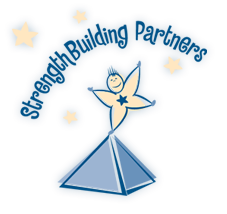Mentoring Program Description
 SBP Mentor celebrates his mentee's promotion.
SBP Mentor celebrates his mentee's promotion.
As of the beginning of the 2009 school year, 63 pairs of mentors and mentees are meeting once a week at one of three schools: Johnson Primary, Lawrence Intermediate and Hohokam Middle schools.
Participants
Mentors are recruited for the greater Tucson Community. Mentors can be any adult who is interested in forming a positive one-on-one relationship with a child. We ask mentors to commit to meeting with their mentees once a week for an hour at the school for a minimum of one year.
Mentees are referred by teachers, school staff, parents and even the children themselves. Children who have seen their classmates meeting with mentors have asked to be included in the program. The program is available to any child who would benefit from having a caring adult in his or her life.
Training, Matching and Support
The process to become a mentor includes applying, interviewing, background checks and training before a match is made. Mentors and mentees are matched based on their strengths, common interests and any special needs of the mentee. The initial contact is made at a "Meet Your Mentor" party where several mentors and mentees are meeting each other for the first time.
StrengthBuilding Partners manages the Mentoring Program and makes it easy to be a mentor. SBP staff provides training and support, makes all arrangements with the schools and provides activities for mentors to do with their mentees.
What the Mentors Say
What Mentees Say
“Thank you for being my Mentor for three years. It’s been really fun and I think you are a good Mentor.”
“Thank you for being my Mentor. It is always good to see you. You are the best Mentor ever. Thanks a lot.”
“I want to thank you for being with me through all these years. I had fun and enjoyed myself. Hope you did to. Thanks for your time and support.”
“I just want to thank you for everything you’ve done for me. I will always remember you and I’ll miss you.”
“I can’t believe how you care for me. I can’t thank you enough. I appreciate your visits these 4 years you made me smile. No other Mentor would make me happy. Thank you very much.”
History of the Program
The program actually began in 2001 when staff at Lawrence Intermediate School identified the need for a mentoring program for their students. As a part of its ongoing relationship with the school, StrengthBuilding Partners created a partnership with the Pascua Yaqui Tribe, Lawrence Intermediate and Johnson Primary to develop plans for a successful program. Key to the program's success is the Pascua Yaqui Tribe's policy that allows employees to volunteer in the schools during their workday.
Evaluation
Evaluation of the program is conducted by Sally Stevens, Ph.D., Professor in the Department of Women's Studies and Executive Director of the Southwest Institute for Research on Women at the University of Arizona. In addition to logs of activities and age-appropriate assessment tools and interviews with the mentees, the researchers track attendance, grades and disciplinary measures for children who are being mentored. Positive outcomes are documented in evaluation reports.


